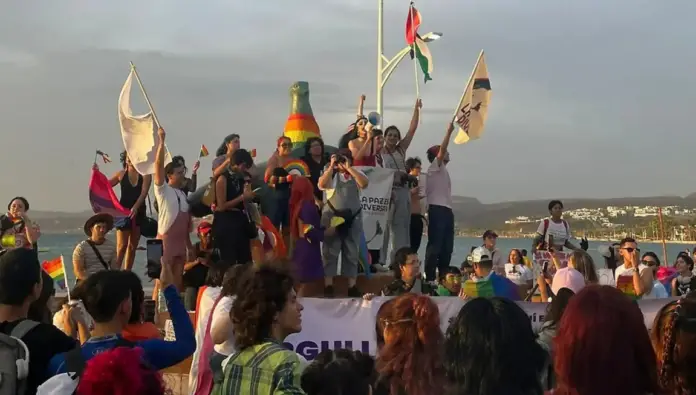Two citizen initiatives benefiting LGBTQ+ people to recognize and guarantee their rights, as well as to classify hate crimes, have reached the Baja California Sur Congress.
In an ordinary public session of Congress on May 13, activists presented the Ociel Baena Law, which proposes to classify homicide based on sexual orientation or gender identity as an independent crime.
They also presented a Law for the Recognition and Care of LGBTTTIQNB+ People, which establishes a comprehensive state policy in favor of sexual and gender diversity.
The Rainbow Movement for Mexico presented a citizen initiative to the local Congress for consideration.
Both proposals were submitted by citizens Angel Fabián Gaxiola Infante and José Raúl Pérez Aguilar, in which they highlighted the urgency of making progress on human rights and access to justice for historically vulnerable populations.
“We want a case like Ociel Baena’s to never happen again in Baja California Sur. We’re not asking for privileges, we’re asking for justice and guarantees that recognize us as people with full rights,” the initiative states.
The initiatives were referred to the Permanent Commission on Constitutional and Justice Matters, chaired by Representative Eduardo Van Wormer Ruiz of Morena, for analysis and ruling.
What are the pillars of the Ociel Baena Law?
The initiative proposes reforming and adding various sections of the state Penal Code to include the crime of homicide based on sexual orientation or gender identity as an independent criminal offense.
It proposes sentences of up to 50 years in prison and includes specific aggravating factors such as sexual violence, mutilation, and a history of hate or discrimination, among others.
In addition, it expands the aggravating factors for crimes of bodily harm and discrimination, aligning them with a human rights perspective.
The Law for the Recognition and Attention of LGBTTTIQNB+ Persons seeks to establish a regulatory framework that requires all state institutions to implement affirmative actions, programs, and measures in favor of the rights of sexual and gender diversity.
This involves all offices of the Executive, Legislative, and Judicial branches, as well as municipalities, autonomous, or decentralized agencies.
The proposal includes the creation of the Unit for Attention to Sexual Diversity (UNADIS), with powers to coordinate inter-institutional actions and policy monitoring.
It also contemplates specific rights in education, health, labor, housing, justice, and culture, with an intersectional approach.
Background: The Case of Ociel Baena
Both initiatives refer to the murder of Ociel Baena Saucedo, the first non-binary magistrate in Mexico and Latin America, in November 2023 in Aguascalientes, in circumstances that generated outrage and suspicions of a hate crime.
Subscribe here to the digital edition of El Sudcaliforniano
Although the official version pointed to a crime of passion, human rights groups have demanded an investigation with a gender perspective and a human rights focus.
With these legislative proposals, activists seek to position Baja California Sur at the forefront of defending the rights of LGBTQ+ people and establishing legal precedents against bias-based violence.

Source: oem




